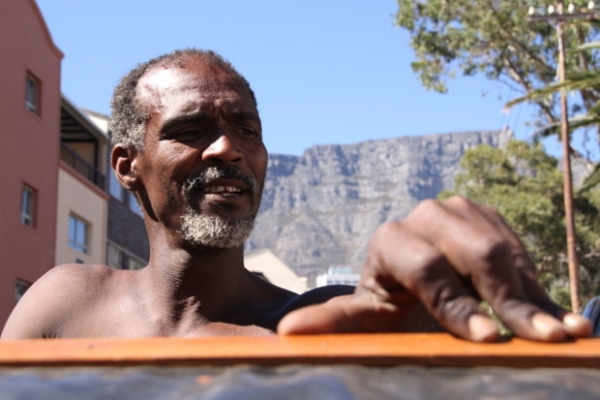Hope Street carpenter shut down

When it is late at night and Cape Town’s streets are quiet, Mark Philander’s faint hammering at his pavement workshop on Hope Street can still be heard.
“They’ve locked me up for ‘sleeping on the street’, but they’ve never actually caught me sleeping,” says Philander, a cheeky smile crossing his face.
He is leaning on a large wooden dog kennel loaded on a trolley – the only piece of his work salvaged after City of Cape Town Law Enforcement officers evicted him from the pavement on Wednesday. City contractors had loaded the material he uses to build furniture on to a truck, and carted it away. It is a regular occurrence, but this time they took everything.
“Usually they leave the scraps and only take completed furniture,” Philander explains.
“They don’t throw it roughly onto the truck; they place it neatly and drive off with it. That furniture is valuable and I doubt that they just dump it somewhere. I’m sure my handiwork is lying all around the houses of these cops. It’s like a freebie for them. But, for me it is theft. They are stealing my livelihood as well as my possessions.”
He has settled in Hope Street, and claims to have the support of the surrounding community. Resident Andrew Thomas seconds that.
“Lester (as Mark is known to residents) is one of the most honest and hard working people I have ever met, and his work is excellent,” said Thomas.
“He works late into the night. It’s amazing. I have supported him, and bought a lot of furniture from him. Everyone loves having him around.”
After this most recent raid, Philander takes the time to share his life story: a street child coming of age in the Cape Town city centre during the 1970s, he grew into a petty criminal and was in and out of jail for most of his 20s. The most recent stint, he says, cost him 20 years of this life (from 1992 to 2012). He does not share details of the crimes for which he served such a long sentence. That is in the past. What matters is that he is straight now and earning an honest keep, he says..
“I have seen the inside of every prison in the Western Cape,” he says, running his fingers across the peak of the kennel’s roof. His bare chest and arms are covered in scars - old wounds which, each in their turn, look as though they may have been life threatening.
“When I came out, I was 49 years old. I took a long look at myself and said, ‘I do not want to turn 50 inside a prison cell’. I decided to turn my back on crime, and that is the man you see before you now.”
But, the City’s Mayco member for Safety and Security JP Smith said that Philander’s business contravened the by-law relating to streets, public places and prevention of nuisances. This by-law prevents people from leaving “goods” in a public space and obstructing pedestrian walk ways. Asked how Philander could go about retrieving his material, Smith added that only “rubble” and timber off cuts were removed. These do not amount to “personal items” in the City’s assessment.
After his release from prison, Philander started roaming the streets in search of cardboard and scrap to carry and sell at the Salt River dump. This brought in enough to feed himself. But, that work was hard and time consuming and the returns were low.
Later in 2012 he came across scrap wood being thrown out during the renovation of Newspaper House in St Georges Mall. With this, Philander put his hands to work. Sitting on the sidewalk, with a hammer and some nails, a little bedside table started to take shape before him.
“I wasn’t even done yet and a woman came up to me and said ‘how much are you selling it for’?” he recalls.
“I didn’t know. I was thinking something like R30 would be okay, but I asked what she thought it was worth. She said ‘how about R350’. Oh boy, I could not believe my ears.”

City of Cape Town contractors confiscated Philander’s work and material, from the Hope Street sidewalk where he works, on Wednesday. Photo by Andrew Thomas.
Since then, as his business grew, Philander has been evicted by Law Enforcement officers from half a dozen locales around the city bowl. His material, tools and finished furniture has been confiscated dozens of times. He tells of the despair that follows a big raid – when hours of work and hundreds of rand of material can be carted off in the blink of an eye.
In most instances, customers have already paid a deposit and contracted for a specific piece of furniture to be built. This deposit, Philander uses use to buy the wood, nails and glue.
“When my stuff gets taken it puts me in a difficult situation, because the deposit money has been spent and I don’t have a product to deliver for them,” he complains. Last week, the removal contractors took two double beds, a coffee table and two dog kennels – all contracted products.
Once it’s gone, it’s gone. At times like these, in the past, Philander has been tempted to throw in the towel. Despondent and angry he once walked to the taxi rank and sold off his tools at give-away prices. He vowed never to return to his pavement workshop. And then, as if it was a sign, he walked past a high pile of discarded, “beautiful”, scrap wood.
“I didn’t know whether to laugh or cry,” he recalls with a smile.
“‘Aaah no! Why did I give my tools away?’ I questioned myself. But I took the wood in any case.”
With those planks he started again. He built another bedside table, like the first one, using a screwdriver as a chisel and a stone as a hammer to shape the wood. In Hope Street he sold it for R250, and so Philander the carpenter was back on track.
“Nowadays they can’t break my spirits anymore,” he says.
“I’ll be back. I’m here, in Hope Street, to stay.”
Next: Farewell to a lovable revolutionary
Previous: Problems and prejudice face Nigerians in Cape Town

This article is licensed under a Creative Commons Attribution-NoDerivatives 4.0 International License.


